Open Source Microscopy Symposium
Developing microscopy tools for neuroscience research and education
by

Fens Forum 2022 (the largest neuroscience meeting in Europe), will take place in Paris in July. The event covers all fields of neuroscience and comprises a range of symposia, technical workshops, plenary and special lectures and poster sessions as well as a number of social events.
Open-Neuroscience in collaboration with the Neuroscience department of the Institute Pasteur and the University of Sussex neuroscience department is organising a satellite event on Open Hardware Microscopy Development. The aim of this event is to bring into focus excellent open projects that permeate education, ease of access and data collection in advanced research environment.
The symposium will take place on July 8th at the Pasteur Institute campus in Paris (28 rue du Dr Roux). It will be divided into a morning workshop session and an afternoon series of talks. Registration is necessary to access the campus :
The workshops will be led by specialists in the field, which will also participate in the afternoon session. By the end of the session, participants will be invited to discuss what they have learned, how they could implement Open-Science microscope in their research, and/or how they could improve/modify their own setup by implementing Open tools on it and how their research protocol could benefit from it.
The afternoon session will be dedicated to a series of talks by our invited specialists. It will be split into two distinct topics/sub-sessions:
- Open-Source microscopy for education and improving ease of access to research equipment.
- Open-Source microscopy for advanced research.
It is our goal that by the end of the day, participants get a full picture of the state of the art for Open-Source Microscopy. It is hoped that development and implementation of such tools and techniques in modern research units promote science accessibility and improve data reproducibility. Furthermore, an earlier and more systematic access to advanced science tools in education could only support shaping the research minds of tomorrow.
Program
Morning session 09:00-12:00
| Workshops | Information Booths |
|---|---|
| OpenFlexure Joe Knapper | Trend in Africa Samyra Salek |
| UC2 Benedict Diederich, Eda Bingöl, Wang Haoran | Institut Pasteur FabLab Eric Nicolau, Tarik Najib, Eglantine Vignal |
| LEGOLish Julien Colombeli | Institut Pasteur CeRIS Anne Lassailly-Bondaz |
| FlyPi Andre Maia Chagas | OpenLabware George Kafetzis |
Afternoon session 13:00-18:00
| 13:00 | Introduction Maxime Zimmermann & Nathalie Aulner |
| 13:20 | OpenFlexure Joe Knapper |
| 13:40 | UC2 Benedict Diederich |
| 14:00 | LEGOLish Julien Collombeli |
| 14:20 | Trend in Africa Samyra Salek |
| 14:40 | — Coffee Break — |
| 15:00 | Mini2P Edvard Moser & Weijian Zong |
| 15:45 | Mesmerize Kushal Kolar |
| 16:10 | nTCscope Filip Janiak |
| 16:40 | — Coffee Break — |
| 16:55 | Open technologies for Super-Resolution in BioImaging Hannah Heil |
| 17:20 | FAIRy Deep Learning for BioImage Analysis Estibaliz Gomez de Mariscal |
| 17:45 | Closing remarks Andre Maia Chagas |
| 18:00 | Social gathering at the local bar |
Detailed program
Morning session
9:00 – 12:00: Morning workshops
· OpenFlexure:
A 3D printed flexure translation stage. The stage is capable of sub-micron-scale motion, with very small drift over time. Which makes it quite good, among other things, for time-lapse protocols that need to be done over days/weeks’ time, and under space restricted areas, such as fume hoods. Additional camera and servo motors, turns the stage into an automated microscope.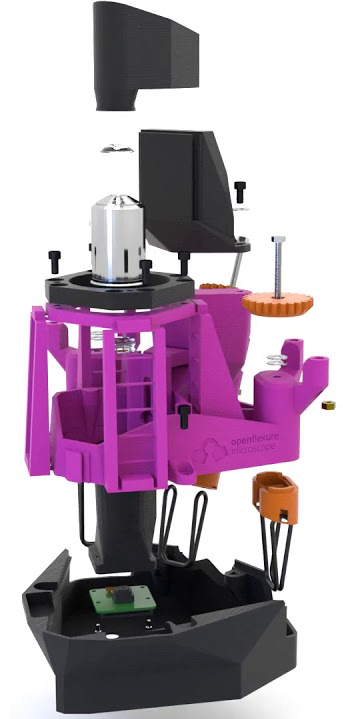
- Richard Bowman, University of Bath, UK
- Julian Stirling, University of Bath, UK
- Joe Kapner, University of Bath, UK
· UC2:
An open-source optical toolbox that simplifies the process of building optical setups, by combining 3D-printed cubes, each holding a specific component (e.g. lens, mirror) on a magnetic square-grid baseplate. The use of widely available consumables and 3D printing, together with documentation and software, offers an extremely low-cost and accessible alternative for both education and research areas.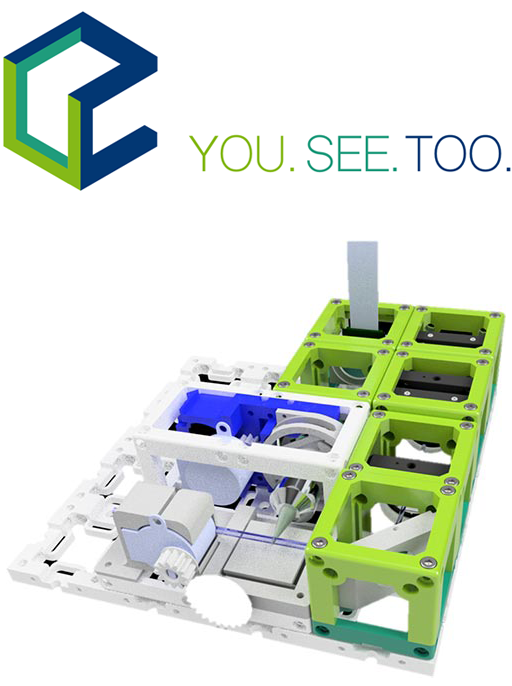
- Benedict Diederich, Leibniz Institute of Photonic Technology, University of Jena
- Rene Richter, Leibniz Institute of Photonic Technology, Germany
- Barbora Marisikova, University of Jena, Germany
· FlyPi:
A 3D-printable open-source platform for fluorescence microscopy, optogenetics and accurate temperature control. Designed for flexibiliy and low-cost, the “FlyPi” is an optical microscope designed for behavioural work with fruit flies, zebrafish or C. elegans. The system is based on a Raspberry Pi with camera, an Arduino microcontroller and a range of off-the-shelf electronic parts. A modular design provides for flexible control of a range of peripherals including options for optogenetic and thermogenetic stimulation and fluorescence microscopy. All mechanical parts are 3-D printed which includes a range of manual or motorised micropositioning options. The basic setup can be put together for below 100€. The low price means that it can be implemented in under-funded labs across the world, for classroom teaching in schools as well as by home-enthusiasts who are not part of the traditional scientific establishment.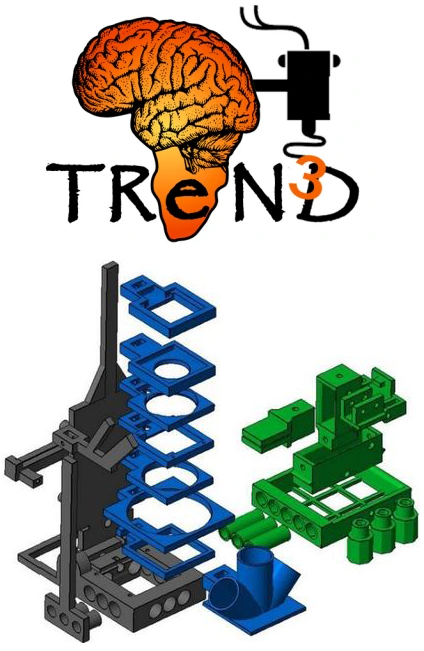
- Andre Maia Chagas, University of Sussex, TReND in Africa
- George Kafetzis, University of Sussex, UK
- Samyra Salek, TReND in Africa, UK
Demonstration Tables / Information booths:
· LEGOLish-mot:
“Compared to many other fluorescence methods, such as confocal microscopy, that have been used in research labs for 30 years, Light Sheet Microscopy is so simple that it can be showcased to anyone and so hopefully it can clear up the perceived mystery surrounding what goes on in the dark rooms of research institutes,” explains Julien Colombelli. And he points out that “the latest and fully motorized version of LEGOLish will enable labs to test a basic Light Sheet system before deciding to purchase a commercial system”. In the current configuration, results generated by LEGOLish cost about 200 to 1000 times less than those produced by a commercial microscope.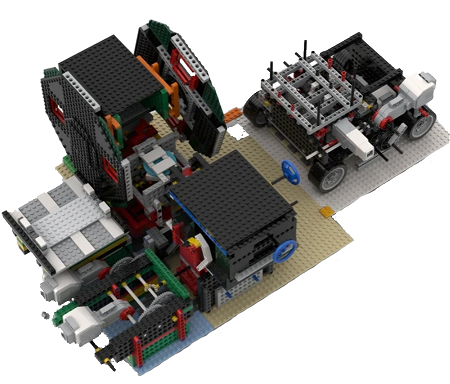
- Julien Colombeli, Institute for Research in Biomedicine, Barcelona, Spain
The FabLab design and produces devices for Pasteur Researchers and help them develop their own prototypes to resolve research questions.
The Institute Prototyping Hub, affiliated to the Technical Resources and Environment Department in the Technical Department is composed of the Fab Lab and the Prototyping Workshop. Our mission is to support scientists in their research and help them resolve technical issues.
Using CAD (computer-aided design) and CAM (computer-aided manufacturing) software and mechanical elements we produce customed experimental systems using various materials (aluminium alloys, stainless steel, titanium, etc.). These components are manufactured in close collaboration with scientists to ensure they meet their needs.
The Fab Lab at Institut Pasteur (FLIP) has tools including laser cutter, bead-blasting unit and 3D printers (FDM, SLA and DLP).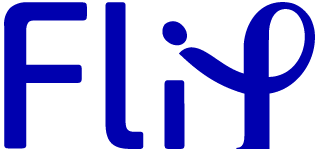
- Eric Nicolau, Institut Pasteur
- Tarik Najib, Institut Pasteur
- Eglantine Vignal, Institut Pasteur
The CeRIS (Scientific Information Resources Center) informs and advises on the goals and practices of the three major Open Science domains: scientific publications in the age of Open Access, data management and sharing, research evaluation and planning. The CeRIS mission is to sensitise the scientific community on Open Science practices to answer national and international enquiries. Their Open Science blog : https://openscience.pasteur.fr/.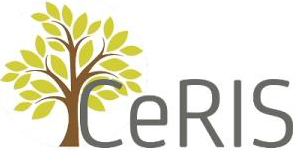
- Anne Lassailly-Bondaz, Institut Pasteur
- Marie Martin, Institut Pasteur
- Anne-Laure Noël, Institut Pasteur
- Contact : hal-pasteur@pasteur.fr
TReND is a charity supporting scientific capacity building across Africa. We run cutting edge biomedical training courses, provide universities with scientific equipment, run academic volunteering and outreach schemes, and support and work with African researchers.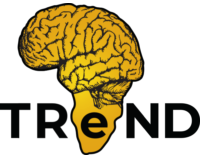
- Samyra Salek, TReNDin Africa
- Andre Maia Chagas, Open Neuroscience, University of Sussex, TReND in Africa
Afternoon session
Open-Source microscopy as a tool for advanced recording in scientific education and to improve the accessibility of cutting-edge research equipment in low resource areas.
13:00: Maxime Zimmermann, Institut Pasteur, Open-Neuroscience
- Introduction
13:10: Nathalie Aulner, Institut Pasteur
- Presentation of France BioImaging
13:20: Benedich Diederich, Institute for photonic technologies, University of Jena, Germany
13:40: Joe Knapper, Centre for Photonics and Photonic Materials University of Bath, UK
- OpenFlexure, - An Open-Source 3D-printed microscope, including a precise mechanical stage to move the sample and focus the optics.
Abstract
14:00: Julien Colombeli, Institute for Research in Biomedicine, Barcelona, Spain
14:20: Samyra Salek, TReND in Africa, NGO, UK
- TReND in Africa – A charity supporting scientific capacity building across Africa and promoting Open-Science to help improve the scientific output on the continent.
Abstract
14:40 – 15:00 : Coffee break
Open-Source microscopy as an efficient drive to collaboratively develop hardware, software, and techniques for advanced optical research.
15:00: Edvard Moser / Weijian Zong, Kavli Institute for Systems Neuroscience and Centre for Neural Computation, Norwegian University of Science and Technology (NTNU), Trondheim, Norway
15:45: Kushal Kolar, Department of Biomedical Engineering, University of North Carolina, US
16:10: Filip Janiak, School of Life Sciences, University of Sussex, Brighton, UK
16:40 – 16:55: Coffee break
16:55: Hannah Heil, Instituto Gulbenkian de Ciência, Oeiras, Portugal
17:20: Estibaliz Gomez de Mariscal, Instituto Gulbenkian de Ciência, Oeiras, Portugal
- FAIRy - Deep Learning for BioImage Analysis
17:40: Andre Maia Chagas, University of Sussex, Brighton, UK. Open Science Coordinator at TReND in Africa
- Andre M. Chagas - Closing remarks
Organizing committee
Samyra Salek - Trend in Africa
Maxime Zimmermann - Institut Pasteur
Natalie Aulner - Institut Pasteur - Imaging Platform
Andre Maia Chagas - University of Sussex
Tom Baden - University of Sussex
Sponsors
EMBO
France BioImaging
University of Sussex
FocalPlane
Independent NeuroScience Services (INSS)
TReND in Africa

